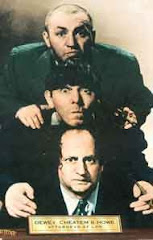
After decades of exploiting the inept rural masses through their subtle manipu-lation, the so-called Family Doctor has finally been positioned for eradication by American Medicine.
Until recently, among the various interests that run this multi-billion dollar industry, there had been disagreement about the best way to snuff out the last remnants of what all agree is an anachronistic, generally unnecessary barrier between these patients and the sub-sub specialists they so desperately need and want. Finally, through a combination siege of decreased reimbursements, federal regulations, paperwork, and public criticism of the lack of professionalism of these "people's doctors", it appears that at last, each medical problem can and will be cared for by a different physician.
The American Medical Association, long-time supporter of the Sub-Specialist cause, applauds the progress. In a series of steps that began with demanding board certification for Family Physicians, then failing to act while "Physician Extenders" (Nurse Practitioners and Physician Assistants) took over the role previously played by the country doctors, they virtually assured the end for Family Medicine. This victory is especially good news for the other major player in the medical industry, the insurance lobby.
With primary care services provided by nurses and medical technologists, the costs are expected to be significantly lower on the front end. Diagnosis is expensive, and by limiting the role of the primary care provider to filling medications and gathering data for the specialists, it is expected to create what is already being gleefully predicted as an "Insurance Boom".
There is an another possible unexpected benefit to this sea-change in the way medicine is practiced. By centralizing medical expertise in larger and larger medical centers, then relegating the data collection duties to physician extenders where the patients live, it should pave the way for the eventual socialization of healthcare. In fact, insurance executives and the government are already looking ahead and working together to find a solution to the next big problem - the glut of subspecialists. With advances in telemedicine, a future with one cardiologist per state seems finally within our grasp.
Patients seem to love this new, less personal style of care. Family doctors and medical schools have been trying for years to force their gentle, relationship-based, preventive-minded approach down their throats. The public has answered with a resounding silence as their methods have been discredited and the practitioners of this ancient art have been put out of business. Finally, it appears that we can say, along with the insurance lobby, the American Socialist Party, and the (for now) safe subspecialists, "Good riddance".











No comments:
Post a Comment